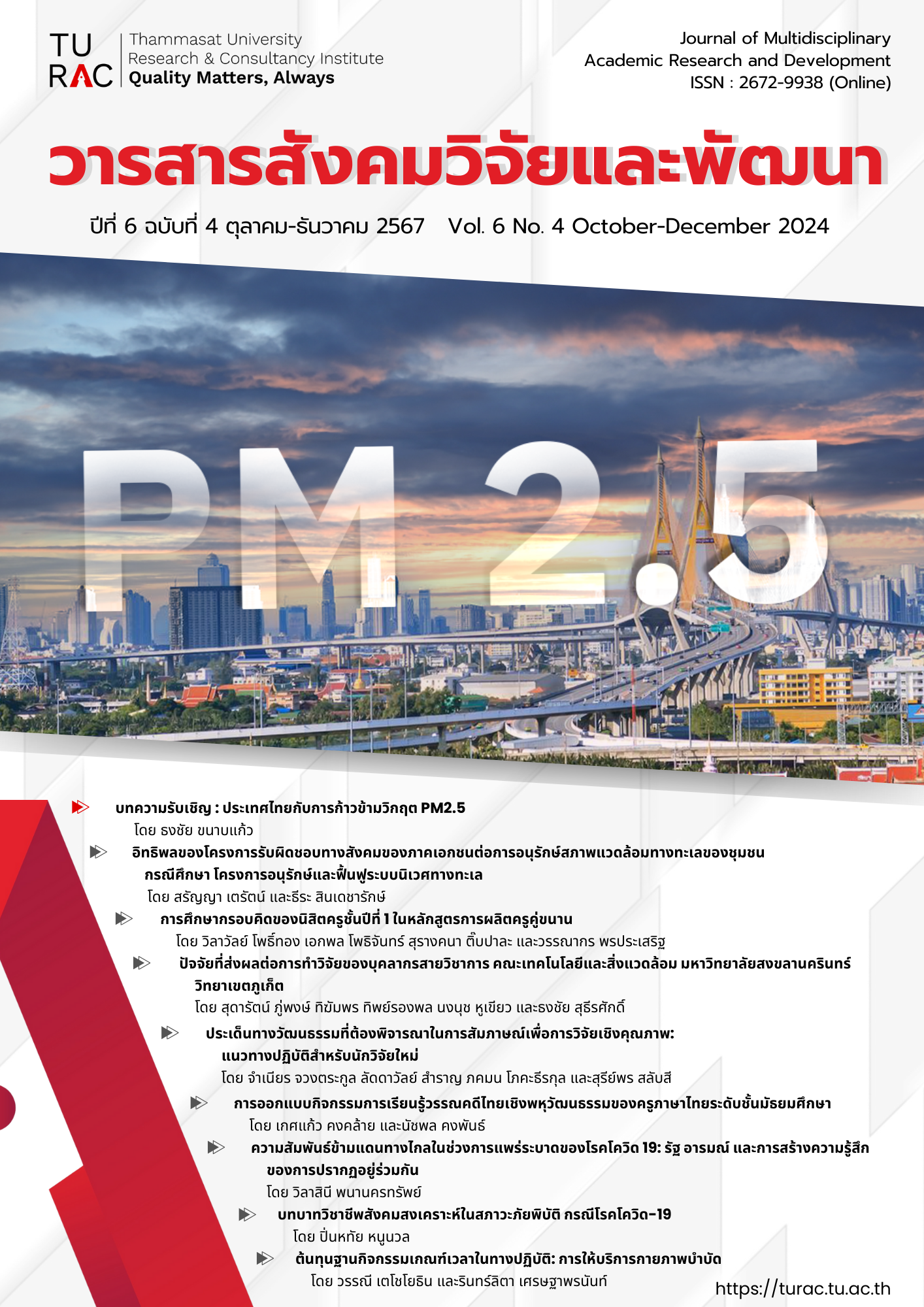The role of the professional social worker in disaster situations : In the case of the outbreak of the COVID-19 virus
Keywords:
The Role, Professional Social work, Disaster Situation, Coronavirus disease-2019Abstract
The aims of this research are 1) to learn about the working models and roles of social workers during the crisis of the COVID-19 outbreak, 2) to present working guidelines of social workers during the crisis, which are appropriate to the changes, and 3) to provide lessons and suggestions for the work of sectors related to social work in Thailand. A mixed method research was applied by using a questionnaire as a survey research tool for the first group of informants, which were social workers working at the Social Development and Human Security Office in 76 provinces. Interview questions were used for the second group of informants, which were social workers in local administrative organizations, university academics who teach in the Faculty of Social Work, and social workers from private development organizations, totally 10 people analyzed data using content analysis. The research results were presented using descriptive statistics.
The research results found that the working models during the crisis COVID-19 outbreak consisted of 1. Management by making merit and charity according to religious beliefs (philanthropy, charity, religious beliefs) 2. Management by using ingenious knowledge and local wisdom 3. Management based on the principles of rights, feminism and equality 4. Disaster management by the state, private sector and local community. Guidelines for working of social workers in crisis situations, propose for immediate relief measures and long-term prevention measures that specifies the operations in 3 phases including pre-pandemic phase, during the pandemic phase, and post-pandemic phase. Suggestions at the policy and practice levels include information management and integration of work between government agencies in each area with volunteer mechanisms in the community.
References
โกมาตร จีงเสถียรทรัพย์ และนฤพนธ์ ด้วงวิเศษ. (2564). ภัยโควิด วิกฤตโคโรนา:โรคอุบัติใหม่ในมิติสังคม.สืบค้นจาก https://shop.sac.or.th/th/product/45/.
ปฐมาภรณ์ บุษปธำรง. (2555). การจัดการภัยพิบัติ:ปรัชญาสวัสดิการและการประยุกต์. วารสารสถาบัน
ราชภัฎแห่งประเทศไทย. 37(3). สืบค้นจาก http://legacy.orst.go.th/royin2014/upload/246/FileUpload/2481_4909.pdf.
สำนักงานพัฒนานโยบายสุขภาพระหว่างประเทศ (IHPP), กองโรคไม่ติดต่อ, กรมควบคุมโรค. (2564).
รายงานผลการทบทวนผลกระทบเชิงเศรษฐกิจและสังคมจากการระบาดของโรคโควิด-19 ในระดับโลก และในประเทศไทย. สืบค้นจาก https://search.yahoo.com/search;_ylt=AwrO_ lv_ByNnGIIA0oRXNyoA;_ylc=X1MDMjc2NjY3OQRfcgMyBGZyA21jYWZlZQRmcjIDc2ItdG9wBGdwcmlkAwRuX3.
อรทัย อาจอ่ำ, วีรญา เดชเฟื่อง, และศิริอาภา อร่ามเรือง. (2556). การศึกษาและพัฒนาระบบการช่วยเหลือทางสังคมในภาวะวิกฤต (พิมพ์ครั้งที่ 1). สถาบันวิจัยประชากรและสังคม มหาวิทยาลัยมหิดล.กระทรวงการพัฒนาสังคมและความมั่นคงของมนุษย์. สืบค้นจาก https://ipsr.mahidol.ac.th/post_research/โครงการ-การศึกษาและพัฒน/.
Creswell, J. W., & Creswell, J. D. (2018). Research design: qualitative, quantitative, and mixed methods approaches (5th ed). Los Angeles: SAGE.
Gebbie, K. M., & Qureshi, K. (2002). Emergency and Disaster Preparedness: Core competencies for Nurses: What every nurse should but may not know. American Journal of Nursing. 102(1), 46-51.
Midgley, J. (1995). Social Development: The Developmental Perspective in Social Welfare. SAGE.
Stein, J. S. (1997). Empowerment and women's health : theory, methods, and practice. London: New Jersey, Zed Books.
Ubalee, C. (2008). Public Participation in Disaster Administration: A Case Study of Din Daeng Community Housing Building. Bangkok. Master’s thesis (Public Administration Branch). Faculty of Political Science: Thammasat University.
Downloads
Published
How to Cite
Issue
Section
License
Copyright (c) 2024 Journal of Multidisciplinary Academic Research and Development (JMARD)

This work is licensed under a Creative Commons Attribution-NonCommercial-NoDerivatives 4.0 International License.



